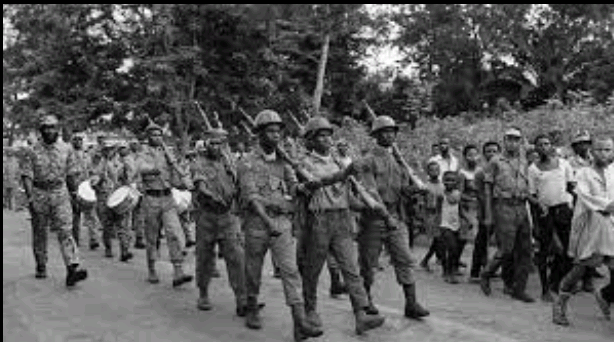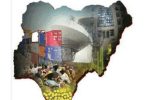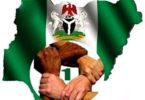The Nigerian Civil War (otherwise called the Biafran War) has left an indelible mark on the country. From observation, the wounds have neither truly healed, nor has the lessons thereof been fully learnt. Thus it is pertinent to revisit the circumstances that led to the war. This is necessary in order to forge a way forward for the multicultural complex and evolving democracy called Nigeria.
The Nigerian Civil War took place between July 1967 and January 1970. It was a clash of tribal sentiments and key military officers; while political short-sightedness was very much part of the problem. It glaringly revealed that marginalization or alienation of any section of a country from governance and decision-making, will surely incite distrust and unending abuses. The war ended, but the distrust (and its sad fallouts) did not end.
Events Leading to The Nigerian Civil War
The Nigerian Civil War was a clash between the armed forces of Nigeria’s military government (back then), and the secessionist state of Biafra. The Republic of Biafra was a cluster of southeastern states of Nigeria (predominantly Igbo people) which had declared its independence from Nigeria in 1967. Biafra was under the leadership of Lieutenant Colonel Chukwuemeka Odumegwu Ojukwu, while General Yakubu Gowon was the military president of Nigeria.
The British colonial government did little to acknowledge the impact of the huge cultural complex called Nigeria, with its over 250 ethnic groups. Each ethnic group had a strong identity to protect. Additionally, the nation had over 500 dialects. But the British colonial government refused to give any recognition to individual tribes, or their peculiar needs. Yet again, the amalgamation of Nigeria under the British government in 1914 was heavily faulted. The northern and southern regions of Nigeria were administered in clearly different ways. It created a divide that refused to heal.
In spite of the many cultural entities that make up Nigeria, the nation was roughly divided into three linguistic and cultural regions. Namely Hausa-Fulani, Igbo, and Yoruba. Over time, the most significant resource of the nation – namely crude oil – was discovered in the southern regions. Southern Nigeria is populated by the Igbo, Yoruba and Niger-Delta tribes. Serious issues bordering on mismanagement of crude oil proceeds, and environmental pollution of the oil-producing regions began to emerge. Unfortunately, following Nigeria’s independence in 1960, the federal government was dominated by the Hausa-Fulani people of northern Nigeria (which remains a serious problem till now).
Just before the war, three key events occurred in quick succession in 1966, leading to the war. Namely a military coup, then a counter-coup, and finally a violent anti-Igbo uprising in Northern Nigeria. The first military coup resulted in the assassination of Nigeria’s first and only Prime Minister, Tafawa Balewa, alongside prominent northern politician Sir Ahmadu Bello. It was led by Igbo military officer, Kaduna Nzeogwu, and four other people; and they killed 22 top politicians and military officers. This took place in January 1966. The officers were subsequently arrested and detained without being tried.
Following the event, General Johnson Aguiyi-Ironsi, the first-ever military ruler of Nigeria, took over the government. The refusal of the military government to take action against Nzeogwu and his co-conspirators incited a big dissent that led to the counter-coup of July 1966. General Aguiyi-Ironsi and Lieutenant-Colonel Adekunle Fajuyi were killed in the counter-coup. And General Yakubu Gowon took over the goverment. A resultant uprising against Igbo inhabitants of northern Nigeria also took place, with many of them either being killed or displaced from the region.
Declaration of Biafra: The Onset of the Nigerian Civil War
The mutiny of the Igbos spurred Lieutenant Colonel Odumegwu Ojukwu to declare the Sovereign State of Biafra, in rejection of the treatment. That was in May 1967. There was an Aburi Accord between Ojukwu and Gowon following the counter-coup, that could have stopped the war. But the conditions of equity in the accord were not honoured by Gowon and his government.
The bloody civil war that followed the declaration of Biafra ended in the capture of Port Harcourt by the Nigerian military forces. Port Harcourt was a key access point to arms and food supplies for the entire southeast and South-South regions at that time. The Biafran forces has enjoyed the financial and material support from many African countries (including South Africa), Portugal, Israel, and France. While the Soviet Union and the UK supported the Nigerian armed forces. The US government maintained a neutral stance.
With all supplies cut off, over two million Biafran troops and indigenes of southeast Nigeria died of starvation. This eventually led to the surrender of the Biafran troops to the Nigerian military forces. But as General Yakubu Gowon stated in his ‘victory’ speech, it was a case of ‘no victor, no vanquished.’
Consequences of The Nigerian Civil War
Quite unfortunately, the resultant crisis following the Nigerian Civil War assumed serious ethnic, religious, and economic dimensions still troubling the country to date. Ever since the war ended, no single Igbo leader has ruled the country. However, they occupied other key positions in government, including the Senate and ministerial cabinet. It led to the general belief that Igbos have been deliberately marginalised in the Nigerian government. Neither did the distrust between the major tribes (especially between Igbos and the Hausa-Fulani tribes) cease.
In fact, some other uprisings along the ethnic and religious divide have continued to occur in Nigeria. Presidential elections and government appointments remain hotly-debated issues. Ethnic clashes involving land, markets, religious activities, and resource sharing, are quite common. The Igbos continue to strive to establish their sovereignty. New pro-Biafra groups such as the Indigenous People of Biafra, and Movement for the Actualization of the Sovereign State of Biafra have emerged, and continue to agitate.
The military government also experienced several military coups following the Nigerian Civil War. And the Nigerian military has progressively become weakened ever since. More importantly, appointments of top military officers (and many government parastatals) by the Presidency have continued to favour the northerners.
Many historians again insist that the Nigerian Civil War contributed to the upended cases of massive corruption and crimes in Nigeria. Unethical practices and high-profile crimes in Nigeria (such as internet fraud and kidnapping) became much worse beginning from the Biafran war.
The Nigerian Civil War: Lessons So Far
On the positive side, the ingenuity and cooperation exhibited by Igbos wherever they find themselves across the world is legendary. Yet again, the determination of the Igbos and South-South tribes to take charge of their lands and resources are resounding messages that cannot be ignored. They continue to prove it in their exemplary trading and industry skills, and their continuous march towards improved technology. So many southeast and south-south indigenes of Nigeria are flourishing in the diaspora as well (more obviously than other categories of Nigerians).
For the Nigerian Federation to truly flourish, the government cannot afford to ignore the agitations of any tribe to be treated with equity. It is also in the best interest of the nation to invite high-level thinkers and problem solvers into the government. Over time, this can be done without regard for their cultural background. But every tribe and region of this country needs to be considered in matters of equity. That needs to be implemented in resource sharing, infrastructural development, government participation, security, and other important aspects of Nigerian life.








